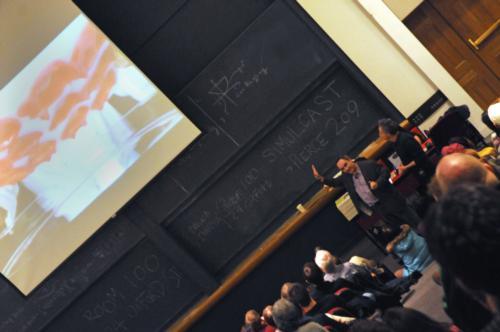
News
Harvard Quietly Resolves Anti-Palestinian Discrimination Complaint With Ed. Department

News
Following Dining Hall Crowds, Harvard College Won’t Say Whether It Tracked Wintersession Move-Ins

News
Harvard Outsources Program to Identify Descendants of Those Enslaved by University Affiliates, Lays Off Internal Staff

News
Harvard Medical School Cancels Class Session With Gazan Patients, Calling It One-Sided

News
Garber Privately Tells Faculty That Harvard Must Rethink Messaging After GOP Victory
Chef Combines Science, Culinary Knowledge

Melon caviar, spherical lemon tea, transparent pasta, and ham consommé are some of the foods that can be found at elBulli, Ferran Adrià’s three-Michelin-star restaurant in Catalonia, Spain. The world-renowned chef, known for mixing food and science, spoke about his novel creations to a packed audience last night in Jefferson Hall.
Adrià has pioneered, for example, the art of melon caviar—he combines cantaloupe and water with the chemicals alginic acid and calcic to create the spherification of tiny caviar-like balls.
The use of scientific techniques—often referred to as molecular gastronomy or molecular cooking—has formed a basis for the cuisine Adrià serves at elBulli.
“In Spain, in high-end cuisine, this is starting to be normal,” he said with the aid of a translator. “It is a new language, and people understand it or they don’t.”
Roberto G. Kolter, a professor of microbiology and molecular genetics at Harvard Medical School, who also served as a translator, said in his introduction that Adrià’s interest in food was sparked only after he realized that he lacked both the skill to become a professional soccer player and the money to pay for an island vacation in Ibiza, Spain.
“His work is about creativity and imagination and innovation in culinary arts,” Kolter said. “His food goes so far beyond tasting good, but they’re really works of art.”
Adrià, dubbed “the Salvador Dalí of the kitchen” by Gourmet magazine, was greeted by a crowd of ardent admirers, some of whom were turned away by the Harvard University Police Department due to space constraints.
The talk consisted, in part, of a video demonstration of many of Adrià’s techniques. He focused on textures and the process by which foods could be made into gelatinous, spherical substances.
But according to Adrià, food, like language, is about both mastery and invention.
“Cooking is a language where we as humans can establish a relationship. Its probably the very first human relationship,” he said. “The more properties [of food] you make new, the more ownership you have over that language.”
The event, sponsored by Harvard’s Materials Research Science and Engineering Center and Nanoscale Science and Engineering Center, is one of two in December that will address the link between art and the science of cooking.
“It is important that science is not treated in a disrespectful way,” he said, of its use in culinary endeavors. “Science is a serious thing, and you don’t treat it like a show.”
Adrià expressed hope that he would be able to work with Harvard’s scientists to write a book about the relationship between food and science.
Food science, Adrià joked is the product of “a mad scientist and a mad cook.”
Want to keep up with breaking news? Subscribe to our email newsletter.
